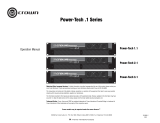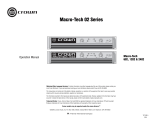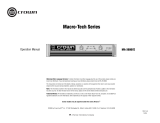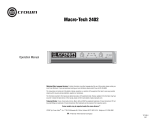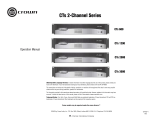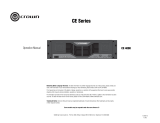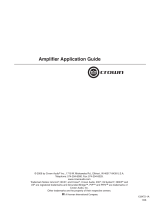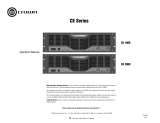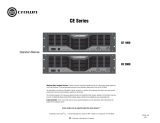Page is loading ...

Operation Manual Micro-Tech
600, 1200, & 2400
Micro-Tech
601, 1201, & 2401
Obtaining Other Language Versions:
To obtain information in another language about the use of this product, please contact your
local Crown Distributor. If you need assistance locating your local distributor, please contact Crown at 574-294-8000.
This manual does not include all of the details of design, production, or variations of the equipment. Nor does it cover every possible
situation which may arise during installation, operation or maintenance.
The information provided in this manual was deemed accurate as of the publication date. However, updates to this information may have
occurred. To obtain the latest version of this manual, please visit the Crown website at www.crownaudio.com.
Trademark Notice:
Crown, Amcron, Crown Audio and ODEP are registered trademarks of Crown International. Grounded Bridge is a
trademark of Crown International. Other trademarks are the property of their respective owners.
Some models may be exported under the name Amcron.®
©2004 by Crown Audio®, Inc. P.O. Box 1000, Elkhart, Indiana 46515-1000 U.S.A. Telephone: 574-294-8000 102990-8
06/04
Micro-Tech Series

Operation Manual
Micro-Tech Series Power Amplifiers
page 2
1) Read these instructions.
2) Keep these instructions.
3) Heed all warnings.
4) Follow all instructions.
5) Do not use this apparatus near water.
6) Clean only with a dry cloth.
7) Do not block any ventilation openings. Install
in accordance with the manufacturer’s instruc-
tions.
8) Do not install near any heat sources such as
radiators, heat registers, stoves, or other
apparatus that produce heat.
9) Do not defeat the safety purpose of the polar-
ized or grounding-type plug. A polarized plug
has two blades with one wider than the other.
A grounding-type plug has two blades and a
third grounding prong. The wide blade or the
third prong is provided for your safety. If the
provided plug does not fit into your outlet,
consult an electrician for replacement of the
obsolete outlet.
10) Protect the power cord from being walked on
or pinched, particularly at plugs, convenience
receptacles, and the point where they exit from
the apparatus.
11) Only use attachments/accessories specified
by the manufacturer.
12) Use only with a cart, stand, bracket, or table
specified by the manufacturer, or sold with the
apparatus. When a cart is used, use caution
when moving the cart/apparatus combination
to avoid injury from tip-over.
13) Unplug this apparatus during lightning storms
or when unused for long periods of time.
14) Refer all servicing to qualified service person-
nel. Servicing is required when the apparatus
has been damaged in any way, such as power-
supply cord or plug is damaged, liquid has
been spilled or objects have fallen into the
apparatus, the apparatus has been exposed to
rain or moisture, does not operate normally,
or has been dropped.
15) To reduce the risk of fire or electric shock, do
not expose this apparatus to rain or moisture.
TO PREVENT ELECTRIC SHOCK DO NOT REMOVE
TOP OR BOTTOM COVERS. NO USER SERVICE-
ABLE PARTS INSIDE. REFER SERVICING TO
QUALIFIED SERVICE PERSONNEL.
À PRÉVENIR LE CHOC ÉLECTRIQUE N’ENLEVEZ
PAS LES COUVERCLES. IL N’Y A PAS DES PAR-
TIES SERVICEABLE À L’INTÉRIEUR. TOUS REPA-
RATIONS DOIT ETRE FAIRE PAR PERSONNEL
QUALIFIÉ SEULMENT.
IMPORTANT
The Micro-Tech 2400/2401 requires Class 1
output wiring. The Micro-Tech 600/601/ &
1200/1201 require Class 2
output wiring.
MAGNETIC FIELD
CAUTION! Do not locate sensitive high-gain equip-
ment such as preamplifiers or tape decks directly
above or below the unit. Because this amplifier has
a high power density, it has a strong magnetic field
which can induce hum into unshielded devices that
are located nearby. The field is strongest just above
and below the unit.
If an equipment rack is used, we recommend locat-
ing the amplifier(s) in the bottom of the rack and the
preamplifier or other sensitive equipment at the top.
WATCH FOR THESE SYMBOLS:
The lightning bolt triangle is used to alert the user
to the risk of electric shock.
The exclamation point triangle is used to alert the
user to important operating or maintenance instruc-
tions.
Important Safety
Instructions
FCC COMPLIANCE NOTICE
This device complies with part 15 of the FCC rules. Operation is subject to the following two condi-
tions: (1) This device may not cause harmful interference, and (2) this device must accept any inter-
ference received, including interference that may cause undesired operation.
CAUTION: Changes or modifications not expressly approved by the party responsible for compliance
could void the user’s authority to operate the equipment.
NOTE: This equipment has been tested and found to comply with the limits for a Class B digital
device, pursuant to part 15 of the FCC Rules. These limits are designed to provide reasonable protec-
tion against harmful interference in a residential installation. This equipment generates, uses, and
can radiate radio frequency energy and, if not installed and used in accordance with the operation
manual, may cause harmful interference to radio communications. However, there is no guarantee
that interference will not occur in a particular installation. If this equipment does cause harmful inter-
ference to radio or television reception, which can be determined by turning the equipment off and
on, the user is encouraged to try to correct the interference by one or more of the following measures:
• Reorient or relocate the receiving antenna.
• Increase the separation between the equipment and receiver.
• Connect the equipment into an outlet on a circuit different from that to which the receiver is con-
nected.
• Consult the dealer or an experienced radio/TV technician for help.

page 3
Micro-Tech Series Power Amplifiers
Operation Manual
DECLARATION of CONFORMITY
Crown International, Inc.
Sue Whitfield
574-294-8289
European Representative’s Name and Address:
Nick Owen
19 Clos Nant Coslech
Pontprennau
Cardiff
CF23 8ND United Kingdom
Equipment Type: Commercial Audio Power Amplifiers
Family Name: Micro-Tech Amplifiers
Model Names: Micro-Tech 600, 1200, 2400, 601, 1201, 2401
EMC Standards:
EN 55103-1:1995 Electromagnetic Compatibility - Product Family Standard for Audio, Video, Audio-Visual and Entertainment Lighting Control Apparatus for Professional Use, Part 1: Emissions
EN 55103-1:1995 Magnetic Field Emissions-Annex A @ 10 cm and 1 M
EN 61000-3-2:1995+A14:2000 Limits for Harmonic Current Emissions (equipment input current 16A per phase)
EN 61000-3-3:1995 Limitation of Voltage Fluctuations and Flicker in Low-Voltage Supply Systems Rated Current 16A
EN 55022:1992 + A1: 1995 & A2:1997 Limits and Methods of Measurement of Radio Disturbance Characteristics of ITE: Radiated, Class B Limits; Conducted, Class B
EN 55103-2:1996 Electromagnetic Compatibility - Product Family Standard for Audio, Video, Audio-Visual and Entertainment Lighting Control Apparatus for Professional Use, Part 2: Immunity
EN 61000-4-2:1995 Electrostatic Discharge Immunity (Environment E2-Criteria B, 4k V Contact, 8k V Air Discharge)
EN 61000-4-3:1996 Radiated, Radio-Frequency, Electromagnetic Immunity (Environment E2, Criteria A)
EN 61000-4-4:1995 Electrical Fast Transient/Burst Immunity (Criteria B)
EN 61000-4-5:1995 Surge Immunity (Criteria B)
EN 61000-4-6:1996 Immunity to Conducted Disturbances Induced by Radio-Frequency Fields (Criteria A)
EN 61000-4-11:1994 Voltage Dips, Short Interruptions and Voltage Variation
Safety Standard:
EN 60065: 1998 Safety Requirements - Audio Video and Similar Electronic Apparatus
I certify that the product identified above conforms to the requirements of the EMC Council Directive 89/336/EEC as amended by 92/31/EEC, and the Low Voltage Directive 73/23/EES as amended by 93/68/EEC.
Signed
Title: Senior Vice President of Manufacturing Date of Issue: January 1, 2001
Issued By: Crown International, Inc.
1718 W. Mishawaka Road
Elkhart, Indiana 46517 U.S.A.
Due to line current harmonics, we recommend that you contact your supply authority before connection.
Larry Colburn

Operation Manual
Micro-Tech Series Power Amplifiers
page 4
Table of Contents
Important Safety Instructions .................................. 2
Declaration of Conformity ....................................... 3
1 Welcome ...................................... 5
1.1 Features ...................................................... 5
1.2 Unpacking Your Amplifier ........................... 5
2 How to Use This Manual .................... 5
3 Setup ........................................... 6
3.1 Unpack Your Amplifier ............................... 6
3.2 Install Your Amplifier ................................. 6
3.3 Ensure Proper Cooling .............................. 6
3.4 Choose Input Wire and Connectors ........... 7
3.5 Choose Output Wire and Connectors ........ 8
3.6 Wire Your System ...................................... 9
3.6.1 Stereo Mode ..................................... 9
3.6.2 Bridge-Mono Mode .......................... 9
3.6.3 Parallel-Mono Mode ........................ 9
3.7 Set Input Sensitivity ................................... 10
3.8 Set Ground Lift Switch ............................... 10
3.9 Connect to AC Mains ................................ 10
3.10 Startup Procedure .................................... 10
4 Operation ..................................... 11
4.1 Precautions ................................................ 11
4.2 Controls, Indicators and Connectors .......... 12
4.2.1 Front Panel Facilities ......................... 12
4.2.2 Rear Panel Facilites ............................ 13
5 Advanced Features and Options .........................14
5.1 Protection Systems ........................................................ 14
5.1.1 ODEP .................................................................... 14
5.1.2 Ultrasonic and Radio Frequency Protection .......... 14
5.1.3 Drive Protection .................................................... 14
5.1.4 Transformer Thermal Protection ........................... 14
5.1.5 Fuses and Circuit Breakers ................................... 14
5.2 Accessories ................................................................... 15
5.2.1 Cooling Fan Options ............................................ 15
5.2.2 Input Connectors Option ..................................... 15
5.3 Filter Cleaning ............................................................... 15
6 Principles of Operation ....................................16
6.1 Overview ....................................................................... 16
6.2 Circuit Theory ............................................................... 16
6.2.1 Stereo Operation ................................................... 17
6.2.2 Bridge-Mono Operation ........................................ 18
6.2.3 Parallel-Mono Operation ...................................... 18
7 Troubleshooting ............................................19
8 Specifications ..............................................20
9 AC Power Draw and Thermal Dissipation ..............22
10 Service ....................................................24
10.1 Worldwide Service ........................................................ 24
10.2 US and Canada Service ................................................ 24
10.2.1 Service at a US or Canada Service Center .......... 24
10.2.2 Factory Service ................................................... 24
10.2.3 Factory Service Shipping Instructions ................ 24
11 Warranty ...................................................25
Crown Factory Service Information Form ................................... 27

page 5
Micro-Tech Series Power Amplifiers
Operation Manual
1 Welcome
The Crown® Micro-Tech 600, 1200 and 2400
are the original industry standards for touring
amplifiers. Micro-Tech amplifiers are known
around the world as the benchmark for high-
density, ultra-pure power in a compact pack-
age. In addition, each model gives you Crown's
legendary ODEP® protection to keep the show
going long after other amplifiers would fail.
Models MT-601, 1201 and 2401(for Japan) are
identical to corresponding models MT-600,
1200 and 2400.
Modern power amplifiers are sophisticated
pieces of engineering capable of producing
extremely high power levels. They must be
treated with respect and correctly installed if
they are to provide the many years of reliable
service for which they were designed.
In addition, the Micro-Tech amplifiers include a
number of features which require some expla-
nation before they can be used to their maxi-
mum advantage.
Please take the time to study this manual so
that you can obtain the best possible service
from your amplifier.
1.1 Features
•Grounded Bridge™ design delivers
incredible voltage swings without stress-
ing output transistors. This results in sig-
nificantly lower distortion and superior
reliability.
• Patented ODEP® (Output Device Emula-
tion Protection) circuitry compensates for
overheating and overload to keep the
amplifier working.
• High damping factor provides superior
motion control over low-frequency drivers
for clean, accurate low end.
• Two mono modes (Bridge-Mono and Par-
allel-Mono) for driving a wide range of
load impedances.
• Full protection against shorted outputs,
open circuits, DC, mismatched loads,
general overheating, high-frequency over-
loads and internal faults.
1.2 Unpacking Your Amplifier
Please unpack and inspect your amplifier for
any damage that may have occurred during
transit. If damage is found, notify the transpor-
tation company immediately. Only you can ini-
tiate a claim for shipping damage. Crown will
be happy to help as needed. Save the shipping
carton as evidence of damage for the shipper's
inspection.
We also recommend that you save all packing
materials so you will have them if you ever
need to transport the unit. Never ship the unit
without the factory pack.
2 How to Use This
Manual
This manual provides you with the necessary
information to safely and correctly set up and
operate your amplifier. It does not cover every
aspect of installation, setup or operation that
might occur under every condition. For addi-
tional information, please consult Crown's
Amplifier Application Guide (available online at
www.crownaudio.com), Crown Tech Support,
your system installer or retailer.
We strongly recommend you read all instruc-
tions, warnings and cautions contained in this
manual. Also, for your protection, please send
in your warranty registration card today. And
save your bill of sale-it's your official proof of
purchase.

Operation Manual
Micro-Tech Series Power Amplifiers
page 6
3.1 Unpack Your Amplifier
YOU WILL NEED (not supplied):
• Input wiring cables
• Output wiring cables
Rack for mounting amplifier (or a stable surface
for stacking)
WARNING: Before you start to set up
your amplifier, make sure you read and
observe the Important Safety Instruc-
tions found at the beginning of this man-
ual.
3.2 Install Your Amplifier
CAUTION: Before you begin, make sure
your amplifier is disconnected from the
power source, with power switch in the
“off” position and all level controls
turned completely down (counterclock-
wise).
Use a standard 19-inch (48.3 cm) equipment
rack. See Figure 3.1 for amplifier dimensions.
You may also stack amps without using a cabi-
net.
NOTE: When transporting, amplifiers should be
supported at both front and back.
3.3 Ensure Proper Cooling
When using an equipment rack, mount units
directly on top of each other. Close any open
spaces in rack with blank panels. DO NOT
block front or rear air vents. The side walls of
the rack should be a minimum of two inches
(5.1 cm) away from the amplifier sides, and the
back of the rack should be a minimum of four
inches (10.2 cm) from the amplifier back panel.
Figure 3.2 illustrates standard amplifier airflow.
3 Setup
Figure 3.2 Airflow
Figure 3.1 Mounting Dimensions
ODEP
CH1 CH2
POWER
OFF
19 in
48.3 cm
16 in
40.6 cm
3.5 in
8.9 cm
SIDE VIEW

page 7
Micro-Tech Series Power Amplifiers
Operation Manual
3.4 Choose Input Wire
and Connectors
Crown recommends using pre-built or profes-
sionally wired, balanced line (two-conductor
plus shield), 22-24 gauge cables and connec-
tors. Depending upon which amplifier input you
choose, you should use either 3-pin male XLR
connectors, TRS phone connectors, or terminal
forks at the amplifier inputs.
Unbalanced lines may also be used but may
result in noise over long cable runs.
The amplifier input connectors not used for
audio signal input may be used to daisy-chain
the audio signal to other components.
Figure 3.3 shows connector pin assignments for
balanced wiring, and Figure 3.4 shows connec-
tor pin assignments for unbalanced wiring
NOTE: Custom wiring should only be
performed by qualified personnel.
Figure 3.3 Balanced Input
Connector Wiring
Figure 3.4 Unbalanced Input
Connector Wiring
3 Setup

Operation Manual
Micro-Tech Series Power Amplifiers
page 8
3.5 Choose Output Wire and Con-
nectors
Crown recommends using pre-built or profes-
sionally wired, high-quality, two-conductor,
heavy gauge speaker wire and connectors. Use
banana plugs, spade lugs or bare wire for your
output connectors (Figure 3.5). To prevent short
circuits, wrap or otherwise insulate exposed
loudspeaker cable connectors.
Using the guidelines below, select the appropri-
ate size of wire based on the distance from
amplifier to speaker.
CAUTION: Never use shielded cable for
output wiring.
Distance Wire Size
up to 25 ft. 16 gauge
26-40 ft. 14 gauge
41-60 ft. 12 gauge
61-100 ft. 10 gauge
101-150 ft. 8 gauge
151-250 ft. 6 gauge
Figure 3.5 Output Connections
3 Setup

page 9
Micro-Tech Series Power Amplifiers
Operation Manual
3.6 Wire Your System
3.6.1 Stereo Mode
Typical input and output wiring is shown in
Figure 3.6. Turn off the amplifier, and set the
Stereo/Mono mode switch on the back to Stereo.
INPUTS: Connect input wiring for both channels.
OUTPUTS: Maintain proper polarity (+/-) on out-
put connectors.
Connect Channel 1 positive (+) speaker load to
Channel 1 positive terminal of amp; repeat for
negative (-). Repeat Channel 2 wiring as for
Channel 1.
3.6.2 Bridge-Mono Mode
Typical input and output wiring is shown in
Figure 3.6. Turn off the amplifier, and set the
Stereo/Mono mode switch on the back to Bridge
Mono.
INPUTS: Connect input wiring to Channel 1
only.
OUTPUTS: Connect the speaker across the posi-
tive (red) terminals of each channel. Do not use
the negative terminals when the amp is being
operated in Bridge-Mono mode. The load must
be balanced so neither lead is connected to
ground.
CAUTION: Connect only balanced equip-
ment (meters, switches, etc.) to the
Bridge-Mono output. Both sides of the
line must be isolated from the input
grounds or oscillations may occur.
NOTE: To prevent distortion and low lev-
els, the Channel 2 level control should be
set fully counter-clockwise when operat-
ing the amplifier in Bridge-Mono mode.
NOTE: Crown provides a reference of wiring pin
assignments for commonly used connector
types in the Crown Amplifier Application Guide
(Section 1.21.) available at
www.crownaudio.com.
3 Setup
3.6.3 Parallel-Mono Mode
Typical input and output wiring is shown in
Figure 3.6. Turn off the amplifier, and set the Ste-
reo/Mono mode switch on the back to Parallel
Mono. Turn down the Channel 2 level control.
INPUTS: Connect input wiring to Channel 1
only.
OUTPUTS: Connect positive (+) speaker load to
amplifier Channel 1 red (+) binding post. Con-
nect negative (-) speaker load to amplifier Chan-
nel 1 black (-) binding post. Add a 14 gauge (or
larger) jumper wire between the red (+) binding
posts of both channels 1 and 2.
CAUTION: When the amplifier is wired for
Parallel-Mono mode, do not change the
rear switch to Stereo or Bridge-Mono.
Doing that will result in inefficient opera-
tion, high distortion and excessive heat-
ing.
NOTE: Crown provides a reference of wiring pin
assignments for commonly used connector
types in the Crown Amplifier Application Guide
(Section 1.21.) available at www.crownaudio.
Figure 3.6 Three System Connection Methods

Operation Manual
Micro-Tech Series Power Amplifiers
page 10
3 Setup
3.7 Set Input Sensitivity
The three-position input sensitivity switch is
located inside the amplifier behind the MT-XLR
module (Figure 4.2 letter “I”). The switch is set
at the factory to a sensitivity of 0.775 volt for
standard 1 kHz power into 8 ohms. (Factory
setting for International versions is 1.4 V.) If
desired, the sensitivity can be switched to 1.4
volts for standard 1 kHz power into 8 ohms, or
a voltage gain of 26 dB. The 26 dB gain setting
is equivalent to a sensitivity of 2.1 volts for the
Micro-Tech 600, 2.5 volts for the Micro-Tech
1200 and 3.2 volts for the Micro-Tech 2400.
To change the input sensitivity:
1. Remove the back panel cover plate (or
input connector accessory).
2. Locate the access hole for the sensitivity
switch inside the chassis opening (Figure
3.7). The sensitivity switch will not be vis-
ible because it is mounted below the hole.
Use your little finger to reach it.
3. Set the switch to the desired position
noted on the label beside the access hole.
4. Replace the back panel cover plate (or
input connector accessory).
3.8 Set Ground Lift Switch
The ground lift switch (Figure 3.7) is located
on the back panel and can isolate the input sig-
nal grounds from the AC (chassis) ground. It
affects only the phone jack inputs and has no
effect on accessory input connectors. Sliding
the switch to the left isolates or “lifts” the
grounds by placing an impedance between the
sleeve of each phone jack and the AC ground.
The Micro-Tech 2400 has two reset switches
for its high-voltage power supplies. Refer to the
Troubleshooting Section in the unusual event
of a tripped breaker.
3.9 Connect to AC Mains
Connect your amplifier to the AC mains power
source (power outlet) with the supplied AC
power cordset.
WARNING: The third prong of the power
connector (ground) is an important
safety feature. Do not attempt to disable
this ground connection by using an
adapter or other methods.
Amplifiers don't create energy. The AC mains
voltage and current must be sufficient to deliver
the power you expect. You must operate your
amplifier from an AC mains power source with
not more than 10% variation above or below
the amplifier's specified line voltage and within
the specfied frequency requirements (indicated
on the amplifier's back panel label). If you are
unsure of the output voltage of your AC mains,
please consult your electrician.
3.10 Startup Procedure
Use the following procedure when first turning
on your amplifier:
1. Turn down the level of your audio source.
2. Turn down the level controls of the ampli-
fier.
3. Turn on the “Power” switch. The Power
indicator should glow.
4. Turn up the level of your audio source to
an optimum level.
5. Turn up the Level controls on the amplifier
until the desired loudness or power level is
achieved.
6. Turn down the level of your audio source
to its normal range.
If you ever need to make any wiring or installa-
tion changes, don't forget to disconnect the
power cord.
For help with determining your system's opti-
mum gain structure (signal levels) please refer
to the Crown Amplifier Application Guide,
available online at www.crownaudio.com.
Figure 3.7 Input Sensitiviy and Ground Lift Switches
0.77 V
26 dB
SENSITIVITY SWITCH INSIDE ACCESS HOLE
1.4 V
UNBALANCED
INPUT WIRING
BALANCED
INPUT WIRING
+
–
TIP
RING
SLEEVE
GND
+TIP
SLEEVE
GND
THIS AMPLIFIER IS EQUIPPED WITH SELECTABLE INPUT SENSITIVITY. REMOVE COVER PLATE (ABOVE) TO ACCESS SENSITIVITY SWITCH.
CH-2
INPUT GROUND LIFT
(AFFECTS PHONE INPUTS ONLY.) (MONO)
INPUT
GAIN
CH-1
INPUT GAIN
LIFT 0
1
2
3
4
567
8
9
10
11
12
0
1
2
3
4
567
8
9
10
11
12
GROUND LIFT SWITCH

page 11
Micro-Tech Series Power Amplifiers
Operation Manual
4.1 Precautions
Your amplifier is protected from internal and external
faults, but you should still take the following precautions
for optimum performance and safety:
1. Before use, your amplifier first must be configured
for proper operation, including input and output
wiring hookup and Stereo/Mono-switch setting.
Improper wiring can result in serious operating diffi-
culties. In Parallel-Mono mode, a jumper is used
between the red (+) Channel 1 and 2 output binding
posts. To prevent distortion and overheating,
remove this jumper for Bridge-Mono and Stereo
modes.
For information on wiring and configuration, please
consult the Setup section of this manual or, for
advanced setup techniques, consult Crown's Ampli-
fier Application Guide available online at
www.crownaudio.com.
2. Use care when making connections, selecting signal
sources and controlling the output level. The load
you save may be your own!
3. Do not short the ground lead of an output cable to
the input signal ground. This may form a ground
loop and cause oscillations.
4. Never connect the output to a power supply,
battery or power main. Electrical shock may
result.
5. Tampering with the circuitry, or making unautho-
rized circuit changes may be hazardous and invali-
dates all agency listings.
6. Do Not operate the amplifier with the ODEP LEDs
turning off.
7. Do Not overdrive the mixer, which will cause clipped
signal to be sent to the amplifier. Such signals will
be reproduced with extreme accuracy, and loud-
speaker damage may result.
8. Do Not operate the amplifier with less than the rated
load impedance. Due to the amplifier's output pro-
tection, such a configuration may result in prema-
ture clipping and speaker damage.
Remember: Crown is not liable for damage that results
from overdriving other system components.
4 Operation

Operation Manual
Micro-Tech Series Power Amplifiers
page 12
4.2 Controls, Indicators and
Connectors
4.2.1 Front Panel Facilities
A. Filter Grille
Supports and protects the dust filter (B). To
clean the dust filter, detach the grille by remov-
ing the three screws that hold it in place.
B. Dust Filter
Removes large particles from the air drawn by
the cooling fan. Check the filter regularly to
prevent clogging. The filter can be cleaned by
soaking in a mild detergent (e.g. dishwashing
liquid).
C. ODEP Indicators (Output Device
Emulation Protection)
During normal operation, these amber indica-
tors glow brightly to show that reserve thermo-
dynamic energy is present. They dim
proportionally as energy reserves decrease. In
the rare event that energy reserves are depleted,
the ODEP indicators turn off and the protection
circuitry proportionally limits output drive so
the amplifier can safely continue operating even
under extreme conditions. These indicators
also help identify more unusual operating
conditions (see Section 5.1.1 on ODEP and
Section 7 on Troubleshooting).
D. Enable Indicator
Lights when the amplifier is on. AC power is
available and the low-voltage power supply and
fan are operational. Does not indicate the status
of the high-voltage power supply (see Section
6 on Troubleshooting).
E. Power Switch
Amplifier is on when the switch is in the "on"
position. When turned on, the output is muted
for approximately four seconds to protect your
system from start-up transients.
Figure 4.1 Front Panel Indicators and Grille
4 Operation
ODEP
CH1 CH2
POWER
OFF
AB C C D E

page 13
Micro-Tech Series Power Amplifiers
Operation Manual
4.2.2 Rear Panel Facilities
F. Power Cord
All units are shipped with an approprate plug and
cord for the required AC voltage.
G. Stereo/Mono Modes Switch
• Use Stereo mode for normal two-channel oper-
ation.
• Use Bridge-Mono mode to drive a single chan-
nel with a load impedance of at least 4 ohms.
• Use Parallel-Mono mode to drive a single
channel with a load impedance less than 4
ohms.
Important: Turn off the amplifier before changing the
Stereo/Mono modes switch.
H. Reset Switches (Micro-Tech 2400 only)
The Micro-Tech 2400 has two push-button reset
swiches on the back panel that are used to reset the
circuit breakers for the high-voltage power supplies.
Refer to Section 5.1.5 in the rare event of a tripped
breaker.
I. MT-XLR Module
This module provides two balanced XLR inputs.
Because the MT-XLR connectors are in parallel with
the amplifier’s built-in phone connectors, an input
signal fed to either input can be fed to another
amplifier from the unused connector for that chan-
nel. If you prefer to use barrier block inputs instead,
order the MT-BB accessory (see Section 5.2).
Input Sensitivity Switch
The three-position input sensitivity switch (Figure
4.2) is located inside the amplifier behind the MT-
XLR module (I). See Section 3.7 for details.
J. Level Controls
Used to set the amplifier's output levels. These con-
trols are on the back panel to prevent tampering. Be
sure to turn down the Channel-2 level control (fully
counterclockwise) when operating in Bridge-Mono
or Parallel-Mono mode.
K. Balanced Phone Jack Inputs
A balanced ¼-inch phone jack input is provided for
each channel. The jacks may be used with either
balanced (tip, ring and sleeve) or unbalanced (tip
and sleeve) lines (refer to Figure 3.5). Balanced XLR
ijnputs for each channel are provided with the
MT-XLR module. Barrier-block input connectors are
available with the MT-BB accessory (see Section
5.2.2). Caution: Do not use the Channel-2 input in
either mono mode.
L. Ground Lift Switch
Used to isolate the phone jack signal grounds from
the AC power (chassis) ground. Moving the switch
to the "lift" position helps prevent the hum associ-
ated with ground loops. Sliding the switch to the left
isolates or "lifts" the grounds by placing an imped-
ance between the sleeve of each phone jack and the
AC ground.
M. Output Jacks
A pair of versatile binding posts is provided for out-
put connection to each channel. Loudspeakers can
be easily connected using banana plugs, spade lugs
or bare wire (European models do not accept
banana plugs). See Section 3.5.
Figure 4.2 Rear Panel Connectors and Controls
4 Operation
CAUTION:
THIS COVER IS NECESSARY FOR
EFFICIENT COOLING OF THE AMPLIFIER.
REMOVE ONLY TO ACCESS GAIN SWITCH.
0
1
2
3
4
567
8
9
10
11
12
0
1
2
3
4
567
8
9
10
11
12
BRIDGE-MONO WIRING
TURN AMPLIFIER OFF.
SET STEREO/MONO
SWITCH TO
BRIDGE-MONO.
OUTPUT ACROSS
RED TERMINALS
ONLY. (CH-1
IS POSITIVE.)
PARALLEL-MONO WIRING
TURN AMPLIFIER OFF.
SET STEREO/MONO
SWITCH TO
PARALLEL-MONO.
ADD JUMPER (14
GAGE OR LARGER)
ACROSS RED
TERMINALS.
OUTPUT ACROSS CH-1
TERMINALS ONLY.
1
2
3
4
1
2
3
CH-2 CH-1
+
–
–
+
INPUT GROUND LIFT
(AFFECTS PHONE INPUTS ONLY.)
CAUTION:
TURN OFF AMPLIFIER
BEFORE CHANGING THIS SWITCH!
STEREO
BRIDGE
MONO
PARALLEL
MONO
CLASS 1
OUTPUT
WIRING
REQUIRED.
WARNING: TO REDUCE THE RISK OF FIRE OR
ELECTRIC SHOCK DO NOT EXPOSE THIS EQUIPMENT
TO RAIN OR MOISTURE.
OUTPUTS
LIFT
REG. U.S. PAT. OFF.
4,330,809
4,611,180
MODEL: MICRO-TECH 2400 SERIES
AC VOLTS: 120 AMPS: 17 60 Hz
MAXIMUM OUTPUT: 900 WATTS
PER CHANNEL INTO 2 OHMS AT 1 KHz
WITH NO MORE THAN 0.1% THD.
UNBALANCED
INPUT WIRING
BALANCED
INPUT WIRING
+
–
TIP
RING
SLEEVE
GND
+
TIP
SLEEVE
GND
CH-2
(MONO)
INPUT
GAIN
CH-1
INPUT GAIN
THIS AMPLIFIER IS EQUIPPED WITH SELECTABLE INPUT SENSITIVITY. REMOVE COVER PLATE (ABOVE) TO ACCESS SENSITIVITY SWITCH.
®
INTERNATIONAL, INC.
ELECTRONIC EQUIPMENT
ELKHART, IN 46517
MADE IN U.S.A.
SERIAL NUMBER
0000
000000
FGH K KL M MJJ
PUSH TO RESET
I

Operation Manual
Micro-Tech Series Power Amplifiers
page 14
NOTE: For detailed information about these
Crown amplifier features, please consult the
Crown Amplifier Application Guide, available
on the Crown website at www.crownaudio.com.
5.1 Protection Systems
Your Crown amplifier provides extensive pro-
tection and diagnostic capabilities, including
ODEP, ultrasonic/RF protection, drive protec-
tion, and power supply fuses or breakers.
5.1.1 ODEP
Crown invented ODEP to prevent amplifier
shutdown during demanding operation, and to
increase the efficiency of the output circuitry.
To do this, Crown measured the safe operating
area (SOA) of each output transistor before
installing it in an amplifier. Next, Crown
designed intelligent circuitry to simulate the
instantaneous operating conditions of those
output transistors. Its name describes what it
does: Output Device Emulation Protection or
ODEP. In addition to simulating output transis-
tor operating conditions, it compares their
operation to their known SOA. If ODEP sees
that more power will be asked of the output
devices than they can deliver, ODEP immedi-
ately limits the drive level until it falls within the
SOA. Limiting is proportional and kept to an
absolute minimum — only what is required to
prevent output transistor damage.
This level of protection enables Crown to
increase output efficiency to never-before-
achieved levels while greatly increasing reli-
ability. The front-panel ODEP indicators show
whether the amplifier is functioning correctly or
whether ODEP is limiting the drive level.
5.1.2 Ultrasonic and Radio Fre-
quency Protection
Micro-Tech amplifiers have a controlled slew
rate. This means that their design puts a limit
on the frequencies they can reproduce. The
controlled slew rate has no effect on audio per-
formance because the high-frequency limit is
well above 20 kHz. This approach protects the
amplifier and tweeters from radio frequencies.
An amplifier's slew rate only needs to be large
enough to deliver the maximum voltage at the
highest required frequency — higher slew
rates actually let the amplifier reproduce unde-
sirable frequencies.
5.1.3 Drive Protection
This system temporarily removes drive from the
output stages to protect the amplifier and its
loads, and prevents oscillation. Drive protec-
tion can be activated in two situations. First, if
dangerous subsonic frequencies or direct cur-
rent (DC) is detected in the amplifier's output,
drive protection will activate. The amplifier
resumes normal operation when it no longer
detects dangerous output. Activating this pro-
tection is very unlikley, but improper source
signals like subsonic square waves or a
severely clipped signal can activate this sys-
tem.
Second, the amplifier's fault protection system
puts the affected channel into drive protection
mode in rare situations where heavy common-
mode current is detected in its output. The
amplifier should never output heavy common-
mode current unless its circuitry is damaged.
Activating drive protection helps prevent further
damage.
5.1.4 Transformer Thermal
Protection
This activates in the rare case where the unit's
transformer temperature rises to unsafe levels.
Then the amplifier will remove power from the
affected channel's high-voltage power supply,
which puts the channel in drive protection
mode. The channel will return to normal opera-
tion after its transformer cools to a safe temper-
ature.
A transformer can overheat during very severe
conditions: higher than rated output levels,
excessively low-impedance loads, and unreas-
ionably high input signals.
Micro-Tech amplifiers keep working under con-
ditions where other amplifiers would fail. But
even when a Micro-Tech's limits are exceeded,
it will still protect itself — and your investment
— from damage.
5.1.5 Fuses and Circuit Breakers
120 VAC, 60 Hz models and all Micro-Tech
2400s have an internal fuse that protects the
low-voltage power supply and cooling fan. The
high-voltage power supplies for the Micro-Tech
600 and 1200 are protected by internal fuses,
while the power supplies for the Micro-Tech
2400 high-voltage supplies are protected by
circuit breakers.
With rated loads and output levels, the fuses (or
circuit breakers) should shut down the amplfi-
ier only in the rare instance of a catastrophic
failure. ODEP protection keeps the amplifier
operational under most other severe condi-
tions. The fuses (or circuit breakers) can also
shut down the amplifier if extremely low-
impedance loads and high output levels result
in current draw that exceeds their rating. Again,
this should be possible only when operating
outside rated conditions, as when the amplifier
is used to drive a 1-ohm load in Stereo mode,
or when an input signal is clipped severely.
Micro-Tech amplifiers do not blow their fuses
or trip their breakers unless something is
wrong. In the rare event that an internal fuse
blows, please refer the unit to a qualified tech-
nician. If a breaker in a Micro-Tech 2400 trips,
try to identify and correct the problem before
resetting the breakers. If the problem persists,
refer the unit to a qualified technician.
5 Advanced Features
and Options

page 15
Micro-Tech Series Power Amplifiers
Operation Manual
5.2 Accessories
5.2.1 Cooling Fan Options
Every Micro-Tech amplifier has a built-in high-
velocity fan that provides optimum cooling.
Two optional replacement fan blades are avail-
able for special cooling requirments. Crown
part C 6594-3 is a quieter, low-velocity fan
blade that in many cases can provide adequate
cooling. Crown part C 6593-5 is a reverse air
flow fan blade which changes the direction of
the air flow in and out of the amplifier (not rec-
ommended for the Micro-Tech 2400).
Important: The optional replacement fan
blades should only be installed by a
qualified technician.
5.2.2 Input Connectors Option
The MT-BB is an accessory panel that provides
barrier-block input connectors. An MT-BB
accessory might be desirable in applications
requiring bare wire connections. It can also be
used to daisy-chain an input signal from one
amplifier to another, just like the MT-XLR.
The MT-BB must be installed at an authorized
service center or the Crown factory.
5.3 Filter Cleaning
A dust filter is provided on the air intake to the
cooling system (Figure 4.1, letter “B”). If this
filter becomes clogged, the unit will not cool as
efficiently as it should and may produce lower-
than-normal output levels due to high heat-sink
temperature.
To remove the filter, use a phillips screwdriver
to remove the three screws that hold the front
grille in place. Wash the filter with mild dish-
washing detergent and warm water. Be sure to
dry the filter before installing it. Replacement
filters may be ordered from the factory.
Dust filters are not 100% efficient. So, depend-
ing on the local environment, the internal heat
sinks of the amplifier will benefit from periodic
cleaning by a qualified technician. Internal
cleaning information is available from our
Technical Support Group.
5 Advanced Features
and Options
Figure 5.1 MT-BB Input Panel Accessory

Operation Manual
Micro-Tech Series Power Amplifiers
page 16
6.1 Overview
Micro-Tech amplifiers incorporate several tech-
nological advancements including real-time
computer simulation of output transistor stress,
low-stress output stages and an advanced heat
sink embodiment.
Custom circuitry is incorporated to limit tem-
perature and current to safe levels making it
highly reliable and tolerant of faults. Unlike
many lesser amplifiers, it can operate at its
voltage and current limits without self-destruct-
ing.
Micro-Tech amplifiers are protected from all
common hazards that plague high-power
amplifiers including shorted, open or mis-
matched loads; overloaded power supplies;
excessive temperature, chain-destruction phe-
nomenon, input overload and high-frequency
blowups. The unit protects loudspeakers from
input and output DC, as well as turn-on and
turn-off transients.
Real-time computer simulation is used to cre-
ate an analogue of the junction temperature of
the output transistors (hereafter referred to as
the output devices). Current is limited only
when the device temperature becomes exces-
sive—and only by the minimum amount
required). This patented approach called Out-
put Device Emulation Protection (or ODEP)
maximizes the available output power and pro-
tects against overheating—the major cause of
device failure.
Crown also invented the four-quadrant topol-
ogy used in the output stages of each Micro-
Tech amplifier (see Figure 6.1). This special
circuitry is called the Grounded Bridge. It
makes full use of the power supply by deliver-
ing peak-to-peak voltages to the load that are
twice the voltage seen by the output devices.
As its name suggests, the Grounded Bridge
topology is referenced to ground. Composite
devices are constructed as gigantic NPN and
PNP devices to handle currents which exceed
the limits of available devices. Each output
stage has two composite NPN devices and two
composite PNP devices.
The devices connected to the load are referred
to as “high-side NPN and PNP” and the devices
connected to ground are referred to as “low-
side NPN and PNP.” Positive current is deliv-
ered to the load by increasing conductance
simultaneously in the high-side NPN and low-
side PNP stage, while decreasing conductance
of the high-side PNP and low-side NPN.
The two channels may be used together to dou-
ble the voltage (Bridge-Mono) or current (Par-
allel-Mono) presented to the load. This feature
gives you flexibility to maximize power avail-
able to the load.
A wide bandwidth, multiloop design is used for
state-of-the-art compensation. This produces
ideal behavior and results in ultra-low distor-
tion values.
Aluminum extrusions have been widely used
for heat sinks in power amplifiers due to their
low cost and reasonable performance. But mea-
sured on a watts per pound or watts per volume
basis, the extrusion technology doesn’t perform
nearly as well as the heat sink technology
developed for Micro-Tech amplifiers.
The heat sinks in a Micro-Tech amplifier are
fabricated from custom convoluted fin stock
that provides an extremely high ratio of area to
volume, or area to weight. All power devices are
mounted directly to massive heat spreaders that
are electrically at the Vcc potential. Making the
heat spreaders electrically alive improves ther-
mal performance by eliminating the insulating
interface underneath each power device. The
chassis itself is also used as part of the thermal
circuit to maximize utilization of the available
resources.
6.2 Circuit Theory
Each channel is powered by its own power
transformer T100 or T200. Both channels share
a common low-voltage supply. The secondary
output of T100 is full-wave rectified by D109
and is filtered by a large computer grade capac-
itor. A thermal switch embedded in the trans-
former protects it from overheating.
The low-voltage fanformer is rectified by diodes
D1, D2, D3 and D4 to generate an unregulated
24 volts. Monolithic regulators U1 and U2 pro-
vide a regulated ±15 volts.
6 Principles of Operation

page 17
Micro-Tech Series Power Amplifiers
Operation Manual
6.2.1 Stereo Operation
For simplicity, the discussion of Stereo opera-
tion will refer to one channel only. Mono opera-
tion will be discussed later. For specific circuit
references, see the block diagram in Figure 6.1.
The signal at the ¼-inch phone jack input
passes directly to the balanced gain stage
(U104-A and U104-B). The balanced gain stage
causes balanced to single-ended conversion
using a difference amplifier. From there, gain
can be controlled with a potentiometer. The
error amp (U104-C) amplifies the difference
between the output signal and the input signal
from the gain pot, and drives the voltage trans-
lator stage.
From the error amp, the voltage translator stage
routes the signal to the Last Voltage Amplifiers
(LVAs) based on signal polarity. The +LVA
(Q105) and the –LVA (Q110), with their push-
pull effect through the bias servo Q318, drive
the fully complementary output stage.
The bias servo Q318 is thermally coupled to
the heat sink and sets the quiescent bias cur-
rent in the output stage to lower the distortion
in the crossover region of the output signal.
D301, D302, D303, and D304 remove the
charge on the unused portion of the output
stage based on the polarity of the output signal.
With the voltage swing provided by the LVAs,
the signal then gains current amplification
through the Darlington emitter-follower output
stage.
The bridge-balanced circuit (U104-D) receives
a signal from the output of the amplifier and
compares it to the signal at the Vcc supply. The
bridge-balanced circuit then develops a voltage
to drive the bridge-balanced output stage. This
results in the Vcc supply having exactly one
half of the output voltage added to their quies-
cent voltage. D309, D310, D311 and a trimmer
resistor set the quiescent current point for the
bridge-balanced output stage.
The protection mechanisms that affect the sig-
nal path are implemented to protect the ampli-
fier under real-world conditions. These
conditions are high instantaneous current,
excessive temperature, and output device oper-
ation outside safe conditions.
Q107 and Q108 sense output current and act as
a common current limiter. When instantaneous
current exceeds the design criteria, the limiters
remove the drive from the LVAs to limit output
current to safe levels.
6 Principles of Operation
Figure 6.1 Circuit Block Diagram

Operation Manual
Micro-Tech Series Power Amplifiers
page 18
To further protect the output stages, the pat-
ented ODEP circuitry is used. It produces an
analog output proportional to the always
changing die temperature of the output transis-
tor. This output controls the translator stage
previously mentioned, removing any further
drive that may exceed the safe operating area of
the output stage.
Thermal sensors S100 and S200 give the
ODEP circuits vital information on the operat-
ing temperature of the heat sink on which the
output devices are mounted.
Should the amplifier fail in a way that would
cause DC across the output lead, the DC pro-
tection circuit senses this on the negative feed-
back loop and shuts down the output stage
drive until the DC is removed.
6.2.2 Bridge-Mono Operation
By setting the back panel stereo/mono switch
to Bridge-Mono, you can convert a Micro-Tech
amplifier for bridged-mono operation. With a
signal applied to the channel 1 input and the
load connected between the positive (+) output
terminals, twice the voltage can be delivered to
the load.
The channel 1 output feeds the channel 2 error
amp U204-A. The signal feeding channel 2 is
inverted so the channel 2 output will have the
opposite polarity of channel 1. This makes it
possible to deliver twice as much voltage to the
load while the protection mechanisms for each
channel continue to work independently.
6.2.3 Parallel-Mono Operation
With the stereo/mono switch set to Parallel-
Mono, the output of channel 2 is paralleled with
that of channel 1. A suitable jumper capable of
handling high current must be connected
across the positive (+) output terminals to gain
the benefits of this operating mode.
The signal path for channel 1 is the same as
previously discussed, except that channel 1
also drives the output stage of channel 2. The
balanced input, error amp, translators, and
LVAs of channel 2 are disconnected and no
longer control the channel 2 output stage. The
channel 2 output stage and protection mecha-
nisms are also coupled through S1 and func-
tion as one.
In Parallel-Mono mode, the amplifier can
deliver twice the current of a single channel.
Because the channel 2 ODEP circuit is coupled
through S1, the amplifier gains additional pro-
tection if a fault occurs in the channel 2 output
stage. The channel 2 ODEP circuit will limit the
output of both output stages by removing the
drive from the channel 1 voltage translator.
6 Principles of Operation

page 19
Micro-Tech Series Power Amplifiers
Operation Manual
CONDITION: Normal operation.
The Enable (Power) LED is on, and the ODEP LEDs
are on or flickering.
ODEP LEDs on indicates a high energy
reserve. An ODEP LED flickering means that
the energy reserve for the affected channel is dip-
ping.
CONDITION: Normal LED display but
distorted sound.
POSSIBLE REASON:
• Load is wired incorrectly or
Stereo/Mono mode switch is set incorrectly.
Check both.
• Input signal level is too high. Turn down your
amplifier level controls, or turn down the input
signal, until the clip LED goes out.
Check mixer levels and gain staging, mixer clip
lights, and pads built into microphones.
CONDITION: Normal LED display but
no sound.
POSSIBLE REASON:
• Input signal level is very low.
• Level controls are turned down.
• Input cable broken or not plugged in.
• Speakers not connected.
• The amplifier output level is so high that the
breaker has tripped. Try to identify and correct
the problem before resetting the breaker. If the
problem persists, refer the unit to an autho-
rized Crown Service Center.
• The amplifier output is shorted. First discon-
nect your speakers from the affected chan-
nel(s) one by one to determine if one of the
loads is shorted.
CONDITION: Enable LED on, ODEP
LEDs off, no sound. Low-voltage power
supply and fan are still working.
POSSIBLE REASON:
• Transformer thermal protection has activated.
Amplifier will come back on automatically
when it cools.
• ODEP reserves have been depleted and the
amplifier is about to activate protection.
• High-voltage power supply fuse or breaker has
blown.
Check for shorts in the speaker lines. Avoid loads of
1 ohm or less. Let the amplifier cool down, then
reset the breaker (Micro-Tech 2400 only).
CONDITION: All LEDs off.
POSSIBLE REASON:
• The amplifier has lost power.
• The amplifier is not plugged into the power
receptacle.
• The amplifier’s circuit breaker has tripped.
Allow the amplifier to cool; check for shorts in
the speaker lines; remove excessive loads.
Then reset the breaker.
• The amplifier has blown its internal fuse for the
low-voltage power.
supply. Refer the unit to a qualified technician.
• The power switch is off.
7 Troubleshooting
OTHER POSSIBLE CONDITIONS
TO BE AWARE OF:

Operation Manual
Micro-Tech Series Power Amplifiers
page 20
8 Specifications
Minimum Guaranteed Power MT-600 MT-1200 MT-2400
120 VAC, 60 Hz Units, Stereo mode, per channel, both channels driven
1 kHz with 0,1% THD
Stereo, 2 ohms (per ch.)
Stereo, 4 ohms (per ch.)
Stereo, 8 ohms (per ch.)
400 W
325 W
220 W
675 W
480 W
310 W
1,050 W
800 W
520 W
120 VAC, 60 Hz Units, Bridge mono mode
1 kHz with 0.1% THD
Bridge mono, 4 ohms
Bridge mono, 8 ohms
Bridge mono, 16 ohms
750 W
655 W
450 W
1,300
970 W
620 W
2,070 W
1,585 W
1,035 W
120 VAC, 60 Hz Units, Parallel mono mode
1 kHz with 0.1% THD
Parallel mono, 1 ohm
Parallel mono, 2 ohms
Parallel mono, 4 ohms
700 W
665 W
450 W
1,300 W
965 W
620 W
2,080 W
1, 605 W
1, 035 W
Performance MT-600 MT-1200 MT-2400
Frequency Response (at 1 watt, 20Hz - 20 kHz) ± 0.1 dB ± 0.1 dB ± 0.1 dB
Phase Response (at 1 watt, 20Hz - 20 kHz) ±10° ±10° ±10°
Signal to Noise Ratio below full bandwidth power
20 Hz to 20 kHz
A-weighted
>100 dB
>105 dB
>100 dB
>105 dB
>100 dB
>105 dB
Total Harmonic Distortion (THD) at rated power, from 20 Hz to 20 kHz 0.1% 0.1% 0.1%
Intermodulation Distortion (IMD) 60 Hz and 7 kHz at 4:1,
from 163 milliwatts to full bandwidth power < 0.05% < 0.05% < 0.05%
Damping Factor: 10 Hz to 400 Hz >1000 >1000 >1000
Crosstalk (below rated power, 20 Hz to 20 kHz) > 60 dB > 60 dB > 60 dB
Common Mode Rejection (CMR) (20 Hz to 1 kHz) > 70 dB > 70 dB >70 dB
DC Output Offset (Shorted input) ±10 mV ±10 mV ±10 mV
Input Impedance (nominally balanced, nominally unbalanced) 20 k ohms, 10 k ohms 20 k ohms, 10 k ohms 20 k ohms, 10 k ohms
Load Impedance (Note: Safe with all types of loads)
Stereo
Bridge Mono
Parallel Mono
2-16 ohms
4 -16 ohms
1-4 ohms
2-16 ohms
4 -16 ohms
1-4 ohms
2-16 ohms
4 -16 ohms
1-4 ohms
/
